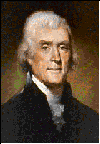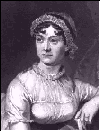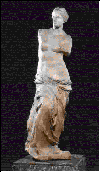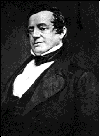1800 Napoleon established himself First Council
 Napoleon's army defeated Austrians and Napoleon's army defeated Austrians and
 conquers Italy conquers Italy
 British captured Malta British captured Malta
 US federal offices moved to Washington DC US federal offices moved to Washington DC
 Goya: "Portrait of a Woman" Goya: "Portrait of a Woman"
 Whitney made muskets with removable parts Whitney made muskets with removable parts
 Ottawa founded Ottawa founded
 France regained Louisiana territory from Spain France regained Louisiana territory from Spain
 Johnny Appleseed arrived in Ohio valley Johnny Appleseed arrived in Ohio valley
 Alessandro Volta invented electric battery Alessandro Volta invented electric battery
 Library of Congress established in Washington DC Library of Congress established in Washington DC
1801 Peace of Lunéville between france & Austria
 Thomas Jefferson, 3rd US President Thomas Jefferson, 3rd US President
 Alexander I, Czar of Russia Alexander I, Czar of Russia
 Robert Fulton made first submarine "Nautilus" Robert Fulton made first submarine "Nautilus"
 Union Jack official flag of Great Britain Union Jack official flag of Great Britain
 Tripolitan War between the United States and Tripolitan War between the United States and
 Tripoli to end extortion payments Tripoli to end extortion payments
 to Barbary Coast pirates to Barbary Coast pirates
 John Marshall Chief Justice of US Supreme Court John Marshall Chief Justice of US Supreme Court
 British defeated Napoleon's army at Alexandria, British defeated Napoleon's army at Alexandria,
 Egypt Egypt
1802 Napoleon became President of Italy
 Peace of Amiens between France & Britain Peace of Amiens between France & Britain
 atomic theory introduced by John Dalton atomic theory introduced by John Dalton
 Gottfried Treviranus coined "biology" Gottfried Treviranus coined "biology"
 Hershel discovered binary stars Hershel discovered binary stars
1803 Louisiana Purchase
 Napoleonic War began, between Britain & France Napoleonic War began, between Britain & France
 Fulton used steam power to power boat Fulton used steam power to power boat
 Henry Shrapnel invented shell Henry Shrapnel invented shell
 Matthew Flinders, 1st circumnavigation of Australia Matthew Flinders, 1st circumnavigation of Australia
1804 Napoleon crowned emperor by Senate
 and Tribunate and Tribunate
 Francis I, Emperor of Austria Francis I, Emperor of Austria
 Spain declared war on Britain Spain declared war on Britain
 Alexander Hamilton killed in duel with Aaron Burr Alexander Hamilton killed in duel with Aaron Burr
 Lewis & Clark began exploring American NW Lewis & Clark began exploring American NW
1805 Napoleon crowned King of Italy
 Walter Scott: "The Lay of the Last Minstrel" Walter Scott: "The Lay of the Last Minstrel"
 Beethoven: "Fidelio" Beethoven: "Fidelio"
 Paganini toured as violin virtuoso Paganini toured as violin virtuoso
 Sartuner isolated morphine Sartuner isolated morphine
 Britain, Austria, Russia & Sweden formed Third Britain, Austria, Russia & Sweden formed Third
 Coalition against France Coalition against France
 Nelson defeated French-Spanish fleet at Trafalgar Nelson defeated French-Spanish fleet at Trafalgar
1806 Joseph Bonaparte, King of Naples
 Louis Bonaparte, King of Holland Louis Bonaparte, King of Holland
 Prussia joined Third Coalition Prussia joined Third Coalition
 official end of Holy Roman Empire official end of Holy Roman Empire
 Zebulon Pike sent to explored Red River Zebulon Pike sent to explored Red River
 Sir Francis Beaufort designed wind strength scale Sir Francis Beaufort designed wind strength scale
1807 Jerome Bonaparte, King of Westphalia
 Mustafa IV, Sultan of Turkey Mustafa IV, Sultan of Turkey
 US Embargo Act against Britain & France US Embargo Act against Britain & France
 US frigate, the Chesapeake was boarded and US frigate, the Chesapeake was boarded and
 four men seized, alleged to be deserters. four men seized, alleged to be deserters.
 France invaded Portugal France invaded Portugal
 Lord Byron, "Hours of Idleness" Lord Byron, "Hours of Idleness"
 Fuller's paddle steamer on Hudson River Fuller's paddle steamer on Hudson River
 Aaron Burr tried for treason but acquitted Aaron Burr tried for treason but acquitted
 Beethoven completed his Fifth Symphony Beethoven completed his Fifth Symphony
 gas street lights in London gas street lights in London
1808 US prohibited importing slaves from Africa
 French army occupied Rome, Napoleon takes French army occupied Rome, Napoleon takes
 Madrid Madrid
 source of Ganges River discovered source of Ganges River discovered
 Pompeii excavations began Pompeii excavations began
1809 war between France and Austria, French
 take Austria take Austria
 Charles XIII, King of Sweden Charles XIII, King of Sweden
 Pope Pius VII taken prisoner by Napoleon Pope Pius VII taken prisoner by Napoleon
 Napoleon divorced Josephine Napoleon divorced Josephine
 James Madison, 4th US President James Madison, 4th US President
 Nicolas Appert developed 1st effective method for Nicolas Appert developed 1st effective method for
 canning food canning food
1810 Napoleon married Archduchess Marie Louise
 of Austria of Austria
 Napoleon ordered sale of seized US ships by Napoleon ordered sale of seized US ships by
 Decree of Rambouillet; Napoleon confiscated Decree of Rambouillet; Napoleon confiscated
 British goods by Decree of Fountainebleau; British goods by Decree of Fountainebleau;
 Napoleon annexed Holland, Hanover, Bremen, Napoleon annexed Holland, Hanover, Bremen,
 Hamburg, Lauenburg and Lubeck Hamburg, Lauenburg and Lubeck
 Venezuela broke from Spain Venezuela broke from Spain
 Samuel Hahnemann founded homeopathy Samuel Hahnemann founded homeopathy
 Phineas T. Barnum born Phineas T. Barnum born
 Kamehameha became ruler of Hawaii Kamehameha became ruler of Hawaii
1811 George III declared insane
 Napoleon annexed Oldenburg Napoleon annexed Oldenburg
 Jane Austen: "Sense and Sensibility" Jane Austen: "Sense and Sensibility"
 William Henry Harrison defeated Shawnee at Battle William Henry Harrison defeated Shawnee at Battle
 of Tippecanoe of Tippecanoe
1812 Napoleon entered Russia, retreats at Moscow
 Napoleon began journey with 450,00 men, Napoleon began journey with 450,00 men,
 returned with 40,000 men returned with 40,000 men
 US declared war on Britain US declared war on Britain
 Duke of Wellington entered Madrid Duke of Wellington entered Madrid
 the Brothers Grimm: "Fairy Tales" the Brothers Grimm: "Fairy Tales"
 Goya: "Portrait of the Duke of Wellington" Goya: "Portrait of the Duke of Wellington"
 earthquake destroyed Caracas, Venezuela earthquake destroyed Caracas, Venezuela
1813 Prussia declared war on France
 Austria declared war on France Austria declared war on France
 "Battle of Nations", France defeated "Battle of Nations", France defeated
 France expelled from Holland France expelled from Holland
 US forces defeated at Chrysler's Farm, near US forces defeated at Chrysler's Farm, near
 Montreal Montreal
 Wellington defeated French at Vitoria Wellington defeated French at Vitoria
 Simon Bolivar, dictator of Venezuela Simon Bolivar, dictator of Venezuela
 Mexico declareed independence Mexico declareed independence
 Jane Austin: "Pride and Prejudice" Jane Austin: "Pride and Prejudice"
 waltz became dance rage of Europe waltz became dance rage of Europe
 symbol of 'Uncle Sam' first used symbol of 'Uncle Sam' first used
1814 Allied forces defeated French, entered Paris
 Napoleon banished to Elba Napoleon banished to Elba
 Louis XVIII, king of France Louis XVIII, king of France
 British army burned Washington DC British army burned Washington DC
 Francis Scott Key wrote poem "Defense of Fort Francis Scott Key wrote poem "Defense of Fort
 McHenry" to become "The Star Spangled Banner" McHenry" to become "The Star Spangled Banner"
 Andrew Jackson defeated Creek Indians at Battle Andrew Jackson defeated Creek Indians at Battle
 of Horseshoe Bend of Horseshoe Bend
 Jesuit order was reestablished Jesuit order was reestablished
 Treaty of Ghent ended War of 1812 Treaty of Ghent ended War of 1812
1815 Napoleon escaped & marched on Paris
 Americans defeated British at Battle of New Americans defeated British at Battle of New
 Orleans before news of treaty arrived Orleans before news of treaty arrived
 Wellington defeated Napoleon at Waterloo Wellington defeated Napoleon at Waterloo
 Napoleon banished to St.Helena Napoleon banished to St.Helena
 Brazil declared independence Brazil declared independence
 Switzerland declared independence Switzerland declared independence
 Barbary States asked for peace with US Barbary States asked for peace with US
1816 Argentina declared independence
 Jane Austen: "Emma" Jane Austen: "Emma"
 Shaka established Zulu empire in South Africa Shaka established Zulu empire in South Africa
1817 James Monroe, president of US
 US began building Erie Canal US began building Erie Canal
 Sir Walter Scott: "Rob Roy" Sir Walter Scott: "Rob Roy"
1818 Chile declared independence
 border between US & Canada agreed upon border between US & Canada agreed upon
 (49 parallel) (49 parallel)
 Mary Wollstonecraft Shelley: "Frankenstein" Mary Wollstonecraft Shelley: "Frankenstein"
 Franz Xaver Huber: "Silent Night" Franz Xaver Huber: "Silent Night"
1819 Florida purchased by US
 Simon Bolivar, president of Columbia Simon Bolivar, president of Columbia
 Beethoven deaf Beethoven deaf
 Mehemet Ali presented "Cleopatra's Needle" Mehemet Ali presented "Cleopatra's Needle"
 to Britain to Britain
 12 hour day maximum set for juveniles in England 12 hour day maximum set for juveniles in England
1820 Missouri Compromise (1 slave state added for
 each free state added to US) each free state added to US)
 Keats: "Ode to a Nightingale" Keats: "Ode to a Nightingale"
 Sir Walter Scott: "Ivanhoe" Sir Walter Scott: "Ivanhoe"
 "Venus de Milo" statue found on island of Melos "Venus de Milo" statue found on island of Melos
 Fabian Gottlieb von Bellingshausen sighted land Fabian Gottlieb von Bellingshausen sighted land
 in Antarctic in Antarctic
 first free African slaves resettled in Liberia, Africa first free African slaves resettled in Liberia, Africa
 Washingtin Irving: "Rip van Winkle" Washingtin Irving: "Rip van Winkle"
 Washington Irving: "Legend of Sleepy Hollow" Washington Irving: "Legend of Sleepy Hollow"
1821 Napoleon died
 Mary Baker Eddy, founder of Christian Mary Baker Eddy, founder of Christian
 Scientists, born Scientists, born
 Rosetta Stone deciphered by Champollion Rosetta Stone deciphered by Champollion
 Captain John Davis first on continent of Antarctica Captain John Davis first on continent of Antarctica
 Cherokee Indian Sequoya developed written Cherokee Indian Sequoya developed written
 Cherokee language Cherokee language
1822 Greece proclaimed independence
 Turks invaded Greece Turks invaded Greece
 Franz Liszt debuted as pianist at 11 Franz Liszt debuted as pianist at 11
1823 Mexico became republic
 Monroe Doctrine warned Europe not to interfere in Monroe Doctrine warned Europe not to interfere in
 the Americas the Americas
 James Fenimore: first of "Leather-Stocking" novels James Fenimore: first of "Leather-Stocking" novels
 Charles Babbage attempted to construct a Charles Babbage attempted to construct a
 calculating machine calculating machine
 Charles Macintosh invented waterproof fabric Charles Macintosh invented waterproof fabric
 Schubert wrote music to "Rosamunde" Schubert wrote music to "Rosamunde"
 rugby football originated in England rugby football originated in England
1824 Simon Bolivar, Emperor of Peru
 first Burmese War first Burmese War
 Erie Canal finished Erie Canal finished
 R.S.P.C.A. founded in London R.S.P.C.A. founded in London
|

Napoleon Bonaparte was probably the most brilliant military figure in history.

Eli Whitney invented the cotton gin and pioneered the use of mass production methods.

Thomas Jefferson was the author of the Declaration of American Independence.

Robert Fulton is best known for his pioneer work in developing the steamboat.

Sir Walter Scott was one of the foremost literary figures of the romantic period and achieved unprecedented popularity during his lifetime.

Ludwig von Beethoven is admired for his instrumental works, including symphonies, concertos, sonatas, and chamber music.

Kamehameha I conquered most of the Hawaiian islands and by 1810 became ruler of a united Hawaii.

Phineas Taylor Barnum is the most famous U.S. showmen.

Jane Austen is known as one of the greatest of British fiction writers.

Venus de Milo

Washington Irving won international acclaim as a distinctively American prose stylist and helped promote the literary efforts of his compatriots both at home and in Europe.
|











